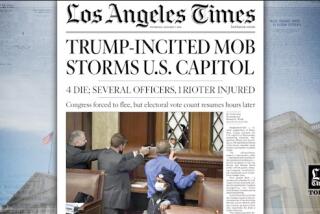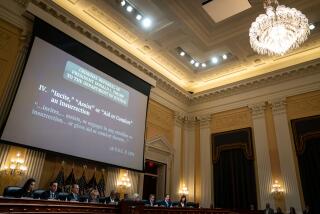The Times Poll : Support for Contra Aid Up Sharply
- Share via
Lt. Col. Oliver L. North’s passionate testimony before a congressional investigating committee may well have generated more public support for President Reagan’s efforts to provide U.S. military aid for the contras, the Los Angeles Times Poll has found.
But the charismatic Marine officer, while scoring a dramatic personal triumph, did not help Reagan’s personal popularity or the way people view his presidency, the survey showed.
In the largest poll yet taken concerning North’s testimony, which captivated millions of television viewers, people were evenly divided on the question of whether the United States should help the contras who are fighting a civil war against Nicaragua’s Marxist regime. The result was 42% to 42%, with 16% undecided.
By contrast, a Times Poll last February found Americans opposed to contra aid, 54% to 31%, with 15% undecided. Surveys by other polling organizations over the last two years have found people opposed to contra aid by ratios of 2 to 1 or more.
Although it is impossible at this point to measure the lasting impact on public opinion of North’s testimony, it is clear that many Americans currently believe he presented a persuasive case for himself regarding his role in the sale of arms to Iran and the diversion of profits to Nicaragua’s rebels.
An overwhelming number of people said they were favorably impressed with North (67%) and considered him to be a convincing witness (74%). They believed his assertion that he acted only under orders from superiors (68%) and said he was “right to follow orders without question, even though they may have been illegal or unethical” (61% to 30%, with 9% undecided).
Lying Supported
Smaller but still significant numbers of people agreed that “there are times when a government official is justified in lying to the American public” (49% agreed, 44% disagreed, with 7% undecided).
In his testimony, North freely admitted lying to Congress about the covert Iran-contra affair before it became public knowledge last November, but he fervently argued that the deception was necessary to protect the operation’s secrecy.
The nationwide telephone survey of 2,311 adults, supervised by Times Poll Director I. A. Lewis, began last Friday and ended on Monday night. The margin of error in the poll is 3 percentage points in either direction.
Reagan’s determination to bankroll the contras and supply them with arms has sparked some of the most divisive foreign policy fights of his presidency. Congress has reversed itself several times--a fact North repeatedly pointed out in his testimony--and faces another battle over the issue this fall, when $70 million in U.S. military aid and $30 million in non-military assistance are due to run out.
Congress had banned U.S. aid for the contras at the time North was involved in funneling profits from Iran arms sales to the Nicaraguan guerrillas. But North insisted to the investigating committee that he had done nothing illegal, declaring: “What we did was constitutional in its essence.”
The White House on Tuesday cited its own polling evidence that North’s testimony had helped to turn around public opinion on contra aid. Reagan’s private pollster, Richard B. Wirthlin, reported that, in a Monday night survey of 600 people, contra aid was slightly favored, 48% to 46%. A similar Wirthlin poll on June 27 found people opposing the aid by more than 2 to 1.
The Times survey showed that North has achieved a recognition most politicians would envy: 94% of Americans are familiar with his name. They describe him most often as “dedicated” and “a man who can get things done.” But only 4% think of him as “a hero,” a characterization applied by Reagan.
Evidence that North’s ardent advocacy of contra aid may indeed have swayed public opinion can be seen by examining the responses of people who said they paid “a lot of attention” to his televised testimony (52%) and those who paid “not much” or no attention (47%). People who paid a lot of attention favored contra aid by 49% to 38%. The figures were virtually reversed for those who paid little attention, 46% against to 34% for.
People who paid a lot of attention to the hearings agreed, more than the others, that a government official sometimes is “justified in lying to the American public,” that North acted under orders from his superiors and that he was right to “follow orders without question,” even if it meant committing “illegal or unethical” acts.
And people who paid a lot of attention to North’s testimony tended to form a more favorable impression of him than they had had before. Impressions became more favorable for 51%; less favorable for only 7%.
But the public had a mixed view of the congressional investigating committee. The characterization most often used was “doing its job.” But next came “politically motivated” and “nit-picking.” Only 6% thought the committee was “fair.”
And, by almost 3 to 2, those surveyed said Congress was “more to blame for the Iran-contra affair” than was Reagan, under whose Administration it occurred. (Congress was blamed by 43%, Reagan by 30%, 12% blamed both equally, and 15% were not sure.)
Another irony, given North’s immense popularity, is that, when people were asked “what upsets you most about the Iran-contra affair,” heading the list was the shredding of documents. North, by his own testimony, was the chief shredder.
Next, people objected to “helping the ayatollah” and “trading arms for hostages while telling our allies not to deal with terrorists.” The least objectionable aspect was “illegally diverting funds to the contras.”
Reagan’s strategy as North’s six days of testimony began unfolding on July 7 was to publicly ignore it. And he wound up not benefiting personally from the outpouring of public support that the articulate former aide generated.
Compared to previous Times surveys, Reagan’s standing did not improve on the measurements of job approval (50%) or the public’s impression of him (58% favorable). A majority believed the President “has lied about the Iran-contra affair” (52% yes, 30% no). And, in particular, they felt that he “knew about the diversion of funds” from the Iran arms sales to the contras (62% yes, 26% no). Reagan has insisted he did not know.
Fifty-nine percent said Reagan’s leadership had been “diminished” or “destroyed.” And 44% felt that at age 76 the President “may be getting too old to keep up with all his responsibilities.”
About half (48%) thought North was not guilty of a crime. Among the rest, 17% believed he was guilty and “should be sent to jail,” 13% figured he was guilty and “should be pardoned” and 22% were not sure. But 61% predicted that, regardless of his guilt or innocence, North would never spend time behind bars.
Also, just 50% felt North “had not lied under oath” to the investigating committee, despite his adamant vow to “tell the whole truth--the good, the bad and the ugly.” Among the rest of those surveyed, 28% said he had lied and 22% were not sure.
If he did lie, it was “to protect the President,” 47% said. Only 16% thought it would have been “to protect himself.”
The survey found great curiosity in the Iran-contra affair generally, with 77% expressing interest. Sixty percent described the congressional hearings as “valuable.” But nearly half also thought they were now “running out of steam.”
NORTH vs. THE COMMITTEE Would you say Oliver North . . .
Is dedicated 37%
Can get things done 27%
Can be bought 11%
Is dangerous 4%
Is a fanatic 4%
Is a hero 4%
Other replies 13%
Would you say the Iran-Contra Committee . . .
Is doing its job 28%
Is politically motivated 20%
Is nit-picking 15%
Is hostile to witnesses 8%
Is thorough 8%
Is fair 6%
Other replies 15%
More to Read
Get the L.A. Times Politics newsletter
Deeply reported insights into legislation, politics and policy from Sacramento, Washington and beyond. In your inbox twice per week.
You may occasionally receive promotional content from the Los Angeles Times.











